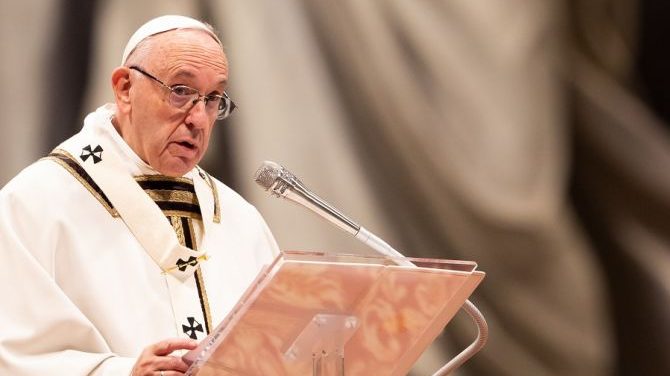Pope Francis invited Europe’s bishops Thursday to not just worry about secularization and a growing lack of faith, but to do something about it by introducing people to the joy of an encounter with Jesus.
“So many people are induced to feel only material needs, and not a need for God,” the pope said at a Sept. 23 Mass in St. Peter’s Basilica. “Certainly, we are ‘preoccupied’ by this, but are we really ‘occupied’ with responding to it?”
“It is easy, but ultimately pointless, to judge those who do not believe or to list the reasons for secularization,” he underlined. “The word of God challenges us to look to ourselves. Do we feel concern and compassion for those who have not had the joy of encountering Jesus or who have lost that joy? Are we comfortable because deep down our lives go on as usual, or are we troubled by seeing so many of our brothers and sisters far from the joy of Jesus?”
Pope Francis’ addressed 39 bishops from Europe during a Mass for the Council of European Bishops’ Conferences (CCEE). The Mass marked the opening of the CCEE’s plenary assembly, which is taking place in Rome Sept. 23-26.
In his homily, Francis reflected on a reading from the Book of the Prophet Haggai.
“Those words – ‘Reflect on your ways!’ – are challenging because today, in Europe, we Christians can be tempted to remain comfortably ensconced in our structures, our homes and our churches, in the security provided by our traditions, content with a certain degree of consensus, while all around us churches are emptying and Jesus is increasingly forgotten,” he said.
He urged them to think about how many people have lost their hunger and thirst for God, because “there is no one to awaken in them a hunger for faith and to satisfy that thirst in the human heart, that ‘innate and perpetual thirst’ of which Dante speaks (Par., II, 19) and which the dictatorship of consumerism gently but insistently tries to suppress.”
Pope Francis also warned about seeing the faith as “a relic of the past,” which he said happens when people have not seen Jesus at work in their own lives.
“Often this is because we, by our lives, have not sufficiently shown him to them,” he told the bishops and others present.
“God makes himself seen in the faces and actions of men and women transformed by his presence,” he said. “If Christians, instead of radiating the contagious joy of the Gospel, keep speaking in an outworn intellectualistic and moralistic religious language, people will not be able to see the Good Shepherd.”
Francis explained that people “will not see the One whose incredible passion we preach: for it is a consuming passion, a passion for mankind. This divine, merciful and overpowering love is itself the perennial newness of the Gospel.”
“It demands of us, dear brothers, wise and bold decisions, made in the name of the mad love with which Christ has saved us.”
According to Pope Francis, “Jesus does not ask us to make arguments for God, but to show him, in the same way the saints did, not by words but by our lives.”
The saints, he said, “were not concerned about dark times, hardships and those divisions that are always present. They did not waste time criticizing or laying blame. They lived the Gospel, without worrying about relevance or politics.”
With the gentle strength of God’s love, the saints “built monasteries, reclaimed land, enlivened the spirit of individuals and countries,” the pope continued. “They did not have a ‘social program,’ in quotes, but the Gospel alone.”
“Let us help today’s Europe, faint with weariness – this is the sickness of Europe today – to rediscover the ever youthful face of Jesus and his Bride. How can we fail to devote ourselves completely to making all people see this unfading beauty?” he concluded.

